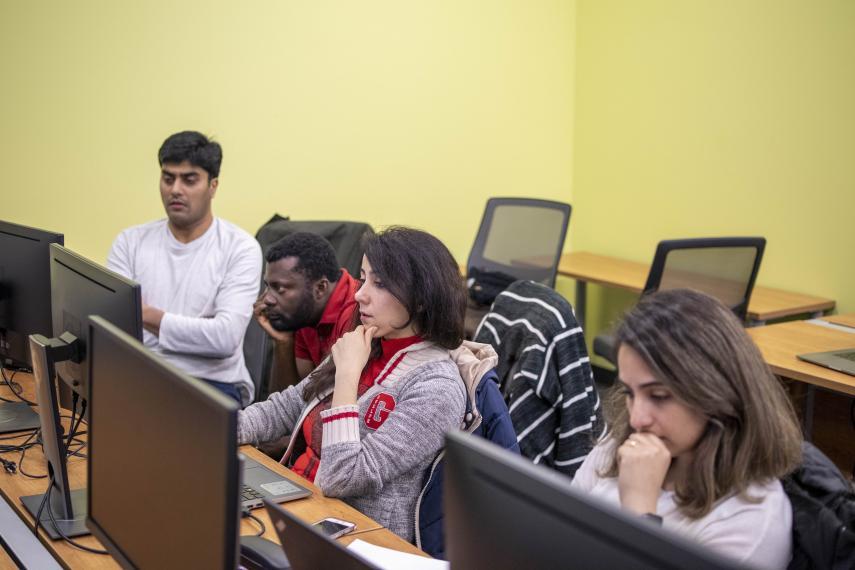Industry Partnerships Drive Leading-edge Learning Experiences

Industry partnerships critical for MCTI program to train cyber security experts.
Industry partners play an integral role in helping the College of Engineering and Physical Sciences (CEPS) achieve its mission to become a national leader in student experience and impactful research. Our course-based Master of Cybersecurity and Threat Intelligence (MCTI) is an example of what can be accomplished when industry and academia come together.
Established in 2019, the MCTI program is headed by Dr. Ali Dehghantanha, associate professor in the School of Computer Science and Tier 2 Canada Research Chair in Cybersecurity and Threat Intelligence. From day one, it was Dehghantanha’s vision to partner with industry and provide real-world learning experiences for students.
 "We strive to provide every student with a blend of practical and theoretical learning experiences that equip them with the leading-edge skills required to fill the global cybersecurity skills gap," explains Dehghantanha. "Our state-of-the-art cybersecurity teaching infrastructure, diverse faculty complement, and strategic partnerships with private industry and governmental organizations are features that set our program apart from similar cybersecurity programs in Canada and abroad."
"We strive to provide every student with a blend of practical and theoretical learning experiences that equip them with the leading-edge skills required to fill the global cybersecurity skills gap," explains Dehghantanha. "Our state-of-the-art cybersecurity teaching infrastructure, diverse faculty complement, and strategic partnerships with private industry and governmental organizations are features that set our program apart from similar cybersecurity programs in Canada and abroad."
The MCTI program has an advisory board comprised of key influencers from technology companies such as Bruce Power, eSentire and ISA Cybersecurity.
"We are thrilled to participate on the MCTI advisory board," says Rob McLeod, VP Threat Response, eSentire. "It enables us to inform the program's curriculum committee about shifting priorities and emerging knowledge gaps in industry."
The curriculum committee weighs the advisory board feedback before deciding whether program changes are required to ensure that MCTI students are well-equipped to meet market demands and fill job openings in the rapidly evolving cybersecurity field. In 2020, the MCTI program entered a memorandum of understanding (MOU) with Mitacs, a national research organization that partners with academia, industry and government to accelerate research and development. The MOU establishes nearly 100 internships over the next five years for students in the MCTI program. The internships are co-funded by Mitacs and MCTI's industry partner network. Through this first-of-its-kind partnership at the University, nine MCTI students engaged in paid internships in 2020–21.
"The interns from the University of Guelph's MCTI program represent the next generation of cybersecurity talent," says Niranjan Mayya, Chief Technology Officer, Innovation, Arctic Wolf. "We provide them with hands-on learning opportunities that prepare them for how to recognize and respond to real-world cyberattacks."
The internships also help to advance our faculty’s research programs. Leopoldine Vassiliou, MCTI student, completed a research internship with ISA Cybersecurity in Spring/Summer 2021 under the supervision of Dr. Charlie Obimbo, professor in the School of Computer Science.
"The support from ISA Cybersecurity and Mitacs enabled me to gain valuable research experience, learn from experts in academia and industry, and expand my professional network—all while receiving financial support," says Vassiliou.
MCTI's industry partners are also making cybersecurity education more accessible by funding scholarships, some of which are reserved for female students. The gender stipulation is aimed at boosting the representation of women in the program and, ultimately, the cybersecurity industry. Bringing more diverse perspectives into the program will enhance the learning environment and lead to more innovative thinking.
“ISA Cybersecurity is proud to partner with U of G's MCTI program,” said Gleb Yevtushenko, Associate Director, Cybersecurity Intelligence & Operations Center at ISA Cybersecurity. "We're passionate about fostering the next generation of cybersecurity experts and supporting education initiatives. That's why we provide scholarships and internship opportunities to MCTI students. In turn, these students become some of our most promising employee prospects and help advance our vision to create a world in which everyone is safe from cyber threats."
This article was originally published in the CEPS 2020–21 Annual Report: It Starts Here.